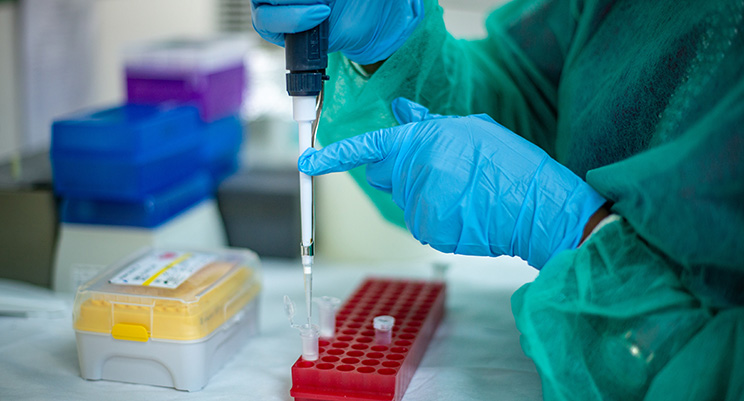
Two students supported through the HEPMAL project, led by EDCTP Senior Fellow Dr Kwadwo Asamoah Kusi (Ghana), successfully completed their thesis as part of the project.
Bright Asare graduated on 23 January 2024 with an MPhil in Applied Parasitology from the Department of Animal Biology and Conservation Science, University of Ghana. His thesis focused on evaluating the immunostimulatory properties of the medicinal plants Moringa oleifera and Phyllanthus niruri extracts in vitro on human peripheral blood mononuclear cells (PBMCs) from chronic HBV carriers and uninfected controls. The extracts induced the release of IL-6, IL-1β, IFN-γ, IL-10, TNF-α and IFN-α in PBMCs from both healthy individuals and chronic HBV patients, however, cytokine levels were in most instances higher in PBMCs from healthy individuals. The reduced responsiveness of immune cells from chronic HBV-infected persons to stimulation may be due to viral persistence and development of the chronic state. Overall, leaf extracts from both plants were safe and also stimulated the release of HBV replication-limiting cytokines and may be important in chronic HBV management. Following his graduation, Bright has secured employment as a Principal Research Assistant in the Acute febrile illness (AFI) lab of the U.S Naval Medical Research Unit 3 (NAMRU3) Ghana detachment, based at the Noguchi Memorial Institute for Medical Research, University of Ghana.
Rawdat Baba-Adam was an MPhil student on the HEPMAL project, registered in the Department of Biochemistry, Cell and Molecular Biology. Her thesis project aimed to assess the effect of antigen polymorphisms on the use of anti-CSP antibodies as markers of recent malaria exposure. The study was able to show and support previous studies that propose that anti-CSP antibody measurements are good alternatives for monitoring malaria transmission. The study also showed that this is especially useful in adults in low transmission areas who may be exposed to the parasite and yet parasite levels in the blood remain undetectable even by PCR. This is a particularly important observation as such infections should be the focus as we progress towards malaria elimination. Additionally, sequencing results demonstrated that though CSP is polymorphic, this does not significantly affect antibody measurements with a standard strain for estimating recent exposure to malaria, among the study participants. She has submitted and defended her thesis and is currently awaiting graduation while putting a manuscript together for publication. She has recently been employed as a project manager on a project that aims to discover novel anti-malarial lead compounds in Africa for low- and middle-income countries populations disproportionally afflicted by malaria and is based at the Department of Chemistry, University of Ghana.
